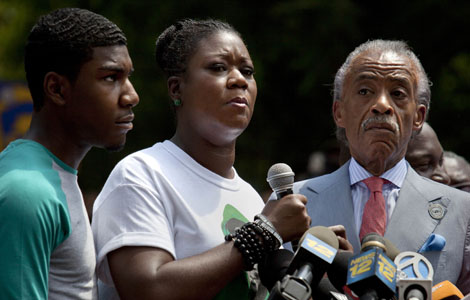"No back-tracking": US' top envoy
Updated: 2013-07-23 11:06
By Chen Weihua in Washington (China Daily)
|
||||||||
|
Danny Russel, assistant secretary of state for East Asian and Pacific affairs, says on Monday in Washington that building a better relationship is one of the three pillars of US policy in the Asia-Pacific region. Sun Chenbei / China Daily |
The US's new top diplomat for East Asia reaffirmed that building a better relationship with China will be one of the three pillars of his country's policy in the Asia Pacific region.
Danny Russel, who started his job as assistant secretary of state for East Asian and Pacific affairs just a week ago, described the other two pillars as modernizing its five treaty alliances in the region - namely Japan, the Republic of Korea, Australia, Thailand and the Philippines - and participating in the building of regional institutions such as the East Asia Summit and Trans-Pacific Partnership (TPP).
"The United States has placed a premium on trying to build a cooperative partnership with China through direct and high-level dialogue," Russel said on Monday in his first press briefing in the new job.
He described himself as being involved in improving the "hugely consequential relationship" with China throughout his career, especially in the last few years when he served as special assistant to the President and National Security Staff senior director for Asian affairs prior to the new post.
"This is an ongoing project. It continues and will continue," said the career diplomat who spent most of his work life dealing with East Asia.
"We are exploring the areas in which cooperation between the US and China, two major economies, can make a positive and practical impact both on the wellbeing and lives of the citizens of both our countries, but also in the region and in the global economy and in the global context," said Russel.
He said the two sides are working hard to develop a candid dialogue in areas of disagreement. "There are areas of disagreements and we need to make sure that we understand the motivations and objectives of the other side," he said.
Russel said such spirit was behind the Sunnylands summit between Chinese President Xi Jinping and US President Barack Obama in California in early June as well as the 5th China-US Strategic and Economic Dialogue in Washington 10 days ago.
"The US and China don't agree on everything, of course, but we talk about everything," said the 59-year-old.
Russel accompanied Secretary of State John Kerry to China in April. He also attended the opening session of the 5th S&ED.
He described the willingness of senior officials to talk directly and constructively on regional and multilateral meetings as "emblematic of the determination of both sides to ensure the lines of communication between our two nations are wide open".
"It is clearly my belief and my impression that maintaining a good line of communication between Washington and Beijing is also a priority for the other countries in the region," he said.
He said countries throughout the region expect and want the US and China to maintain high-level dialogue and practical cooperation to help generate positive results.
Bonnie Glaser, a senior advisor for Asia at the Center for Strategic and International Studies, said the US and China continue to try to promote cooperation where their interests converge, and manage disputes on issues where they disagree.
"President Obama remains committed to developing a positive relationship with China as well as to the US rebalancing to Asia," she said.
"It remains important for our leaders and senior policy officials to have frequent dialogues in person and by phone, to coordinate our respective policies," Glaser said.
Russel said he came away from the recent S&ED with a sense of continued progress, when the two sides talked hot issues such as the denuclearization of the Korean Peninsula, Syria, climate change, cyber space, human rights, maritime security and the relationship between the two militaries.
He described the S&ED as underscoring the global reach and global impact of the world's two largest economies.
"We really show the breadth of our engagement, of the continued strides we are making in expanding meaningful cooperation on issues that are genuinely important to both our people, to the region and to the world as well as the progress in managing areas where we have real disagreements," he said.
Russel said there is no "let-up, no backtracking" of US commitment of rebalancing to the Asia-Pacific region, where the US claims to have enormous interests and investment.
Many Chinese have remained suspicious of the US rebalancing strategy, regarding it as a scheme to contain China's rise. Some US scholars have also called to adjust the strategy to play down the military component and enhance the economic aspect of the program.
Russel, who had worked many years in Japan as a diplomat, emphasized the "peaceful and responsible" management of territorial disputes between China and Japan in the East China Sea.
He said the US continues to encourage the diplomatic process to manage the issue in a way that will reduce tensions, reiterating the US stance of not taking sides on the issue of sovereignty.
However, in China, many see the US stance on the territorial disputes in both the East China Sea and South China Sea as biased in favor of its allies Japan and the Philippines.
On Monday, the Chinese Foreign Ministry website posted news about former Chinese President Jiang Zemin meeting former US Secretary of State Henry Kissinger and his family members in Shanghai on July 3. Both emphasized the importance of a cooperative bilateral relationship to the whole world.
chenweihua@chinadailyusa.com
(China Daily USA 07/23/2013 page1)
Most Viewed
Editor's Picks

|

|

|

|

|

|
Today's Top News
Germany to probe spy services' ties with US
Snowden hopes to leave airport by Wednesday
Quake in NW China kills 89, injures 700
US blacks, whites split on Zimmerman verdict: poll
"No back-tracking": US' top envoy
Kissinger and Jiang see bright future for relations
China sees no major forex withdrawal: regulator
Business holds up for Minmetals arm
US Weekly

|

|















